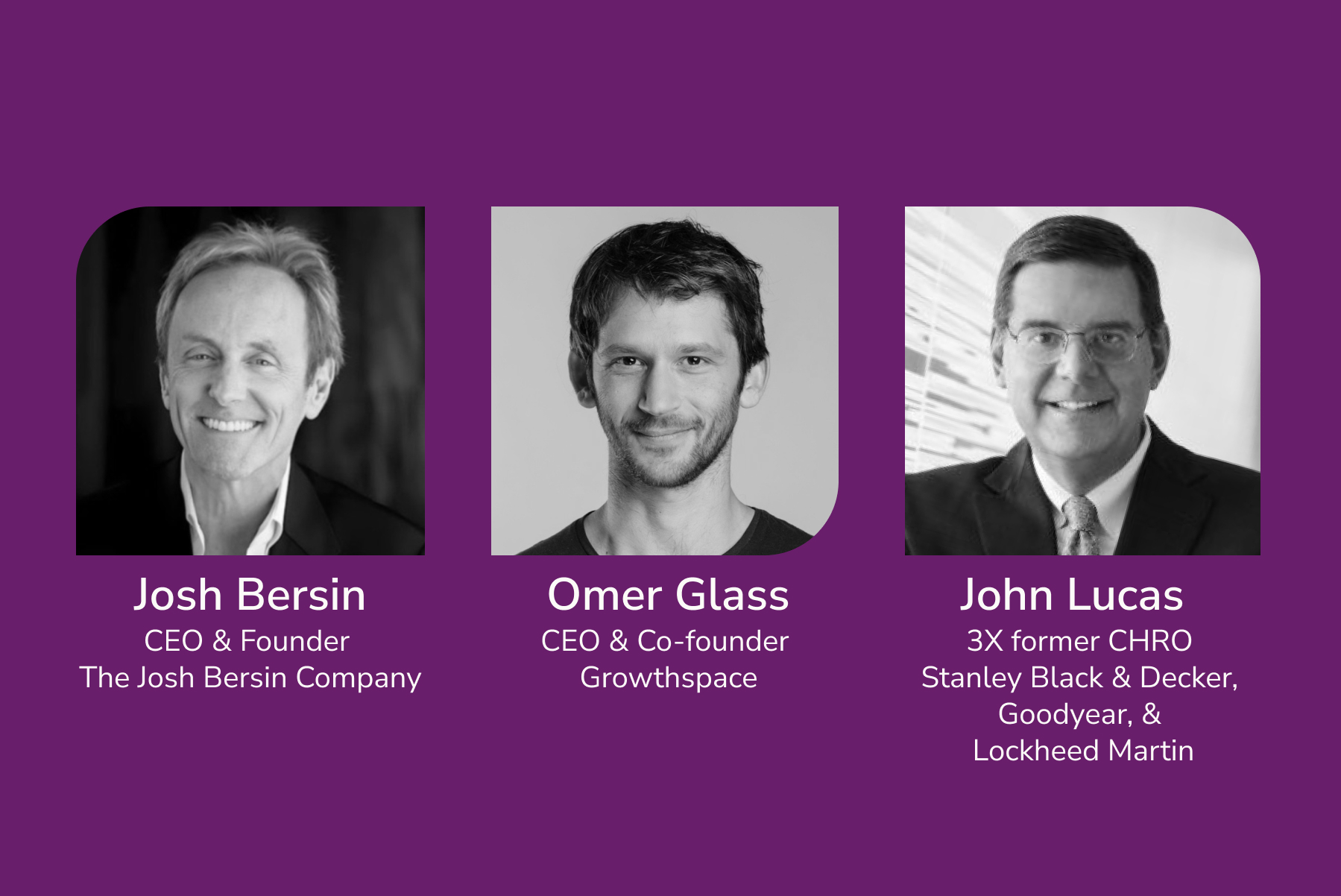On October 8, 2024, industry expert Josh Bersin, former CHRO John Lucas, and Growthspace co-founder and CEO Omer Glass came together for an engaging conversation on precision skill development, moderated by Erin Biehl. They discussed how this targeted approach to upskilling can shape the future of talent growth and business success by focusing on what truly matters: honing specific, high-impact skills.
Here’s a look at some of the key takeaways from this thought-provoking session:
1. What is Precision Skill Development?
Josh Bersin kicked off the conversation by comparing precision skill development to precision medicine. Instead of offering generic training that might not hit the mark, precision skill development zeroes in on the exact skills an employee needs to improve. “It’s not about a one-size-fits-all solution. It’s about really focusing on the specific skill gaps that are holding someone back,” Bersin explained.
Bersin pointed out that many traditional training programs are like “taking aspirin for a headache”—they provide general help but don’t tackle the root of the problem. Precision skill development, on the other hand, gets to the core of what’s needed to drive real change, both for the individual and the business.
2. Why Identifying the Right Skills Matters
One of the biggest challenges in any development program is figuring out which skills to target. John Lucas shared his experience from his time at Lockheed Martin and Stanley Black & Decker. “When we launched a precision skill development pilot for our global supply chain leaders, we didn’t just focus on broad leadership skills. We honed in on five or six key skills directly tied to our business needs,” Lucas explained.
Identifying the right skills can be tricky. As Bersin noted, “Managers often recognize a performance issue but can’t always pinpoint the specific skill gap. That’s where precision skill development shines—it allows for a data-driven, focused approach to figuring out exactly what’s needed.”
3. The Role of Technology in Precision Skilling
Growthspace’s platform uses AI to match employees with the right experts, making it easier to identify and develop the specific skills an employee needs. Omer Glass shared an example: “We had an employee who got feedback about ‘talking too much’ in meetings. Using our platform, we realized the real skill gap was active listening. By matching them with a communication expert, we could address the root issue.”
This kind of targeted feedback-to-skill mapping is a game changer, allowing organizations to quickly act on feedback and see real improvements.
4. Translating Feedback into Actionable Skill Development
One of the key benefits of precision skill development is its ability to break down vague feedback into specific, actionable skills. Lucas emphasized that feedback like “you need to improve communication” isn’t enough—what does that really mean? Does the employee need to work on public speaking, or perhaps active listening?
“Growthspace helps managers and employees break down feedback into specific skills, and then match them with an expert who can help them develop those exact skills,” Glass added.
5. Scaling Precision Skill Development Globally
One of the challenges organizations face is how to scale skill development across global teams. Lucas explained how Stanley Black & Decker tackled this: “We started with a pilot program for 100 global supply chain leaders, each working on different skills but all aligned with our business goals. The success we saw—higher retention, engagement, and productivity—encouraged us to roll it out across other departments.”
Growthspace’s platform makes it possible to scale precision skill development across diverse teams, ensuring every individual’s development aligns with both their personal growth and the company’s goals.
6. How Leadership Drives Precision Skill Development
Leadership buy-in is essential for the success of precision skill development. “It has to start at the top,” Lucas said. “Without leadership championing the program, it’s hard to gain traction.” Leaders need to set the tone by embracing skill development as a strategic priority, helping to foster a culture where continuous growth is valued.
Bersin agreed, adding, “Leaders need to be open to learning about what specific skills are truly needed in their organization. Precision skill development can help uncover those gaps and address them in a way that aligns with both individual and business goals.”
Conclusion: The Power of Precision Skill Development
In today’s fast-changing world, precision skill development isn’t just a nice-to-have—it’s critical. Traditional training programs don’t always meet the needs of today’s workforce, but by focusing on the specific skills that matter most, organizations can ensure their employees are prepared to tackle the challenges ahead.
As Omer Glass put it, “When you focus on the right skills, you get better outcomes. Precision skill development ensures that employees are learning the skills that will have the biggest impact—both for their careers and for the company’s success.”
For a deeper dive into the conversation, watch the full video here:




